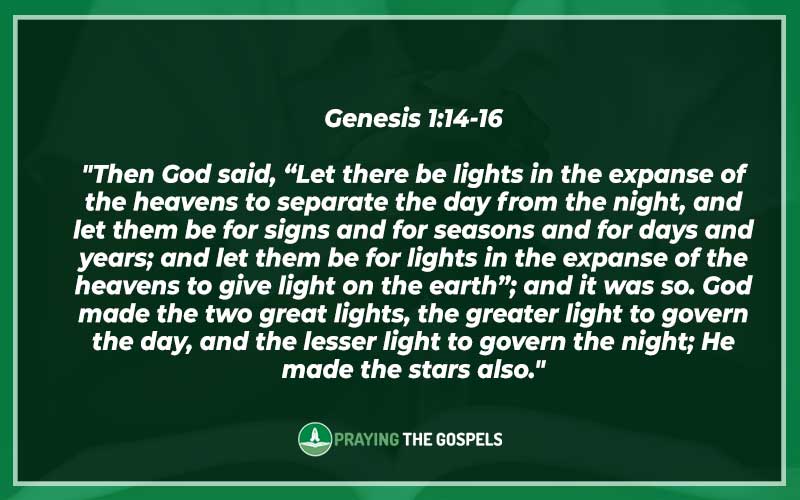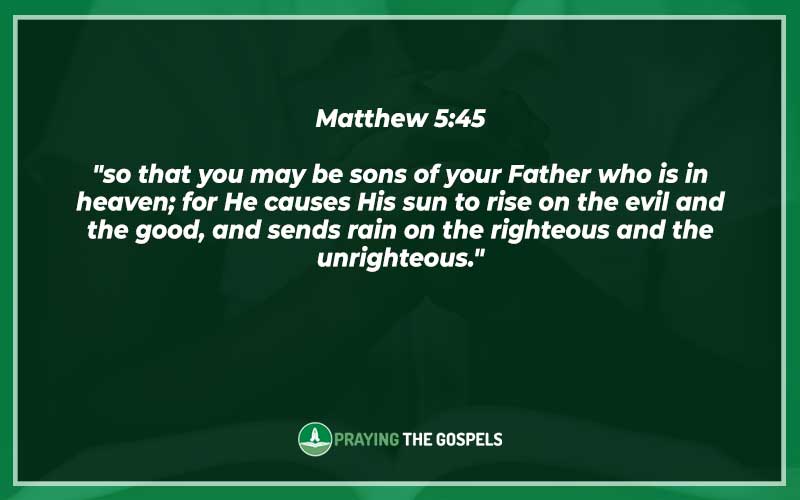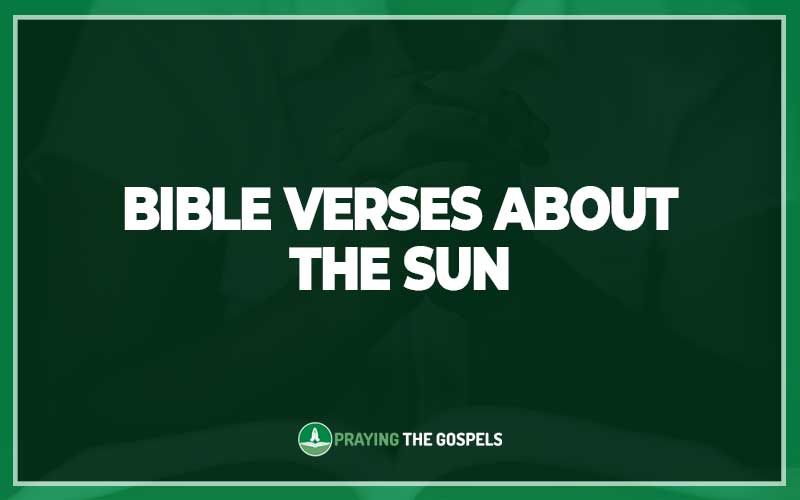The sun is a powerful presence in our lives, providing warmth, light, and energy. From the dawn of time, it has been a symbol of hope, strength, and renewal. It’s no wonder that the sun is often referenced in the Bible, with verses highlighting its importance in both a physical and spiritual sense.
Whether you’re seeking guidance, inspiration, or simply a deeper understanding of the sun’s significance, these Bible verses about the sun are sure to uplift and enlighten you.
Let’s take a closer look at some of these beautiful and insightful passages.
Bible Verses About the Sun
Genesis 1:14-16
“Then God said, “Let there be lights in the expanse of the heavens to separate the day from the night, and let them be for signs and for seasons and for days and years; and let them be for lights in the expanse of the heavens to give light on the earth”; and it was so. God made the two great lights, the greater light to govern the day, and the lesser light to govern the night; He made the stars also.”
This verse highlights the creation of the sun as one of the lights in the expanse of the heavens. It emphasizes the purpose of the sun to give light on the earth and govern the day.

Psalm 19:4-6
“Their line has gone out through all the earth, And their utterances to the end of the world. In them He has placed a tent for the sun, Which is as a bridegroom coming out of his chamber; It rejoices as a strong man to run his course. Its rising is from one end of the heavens, And its circuit to the other end of them; And there is nothing hidden from its heat.”
This Psalm describes the sun as a magnificent part of God’s creation. It likens the sun to a bridegroom coming out of his chamber, representing its beauty and strength. The verse also emphasizes the sun’s pervasive presence and its ability to bring warmth and light to all corners of the earth.
Ecclesiastes 1:5
“The sun rises and the sun sets, and hurries back to where it rises.”
This verse in Ecclesiastes acknowledges the cyclical nature of the sun’s movements. It highlights how the sun rises and sets, only to rise again. It reflects the constancy and predictability in the natural order established by God.
Matthew 13:6
“But when the sun came up, the plants were scorched, and they withered because they had no root.”
In this parable shared by Jesus, the sun represents the scorching heat that withers the plants. It symbolizes the challenges and hardships that can hinder growth and spiritual development if not rooted in the truth of God’s Word.
Matthew 17:2
“And He was transfigured before them; and His face shone like the sun, and His garments became as white as light.”
During the transfiguration of Jesus, His face shone like the sun, radiating divine glory. This event revealed His true nature and identity as the Son of God. It emphasizes His divine light and the radiance of His presence.
John 11:9-10
“Jesus answered, “Are there not twelve hours in the day? If anyone walks in the day, he does not stumble, because he sees the light of this world. But if anyone walks in the night, he stumbles, because the light is not in him.””
Jesus uses the analogy of the daylight to explain the importance of walking in the light of His teachings and presence. Just as the sun provides visibility and guidance during the day, following Jesus brings clarity and avoids stumbling in the darkness of the world.
John 8:12
“Then Jesus again spoke to them, saying, “I am the Light of the world; he who follows Me will not walk in the darkness but will have the Light of life.””
Jesus describes Himself as the Light of the world, highlighting His role in dispelling spiritual darkness and bringing eternal life. Following Jesus guarantees a life filled with His divine light, leading us away from darkness and into the truth.
Psalm 84:11
“For the Lord God is a sun and shield; The Lord gives grace and glory; No good thing does He withhold from those who walk uprightly.”
In this Psalm, the Lord is compared to a sun and shield, representing His role as a source of light and protection. It assures that those who walk uprightly will receive His grace, glory, and abundant blessings.
Malachi 4:2
“But for you who fear My name, the sun of righteousness will rise with healing in its wings; and you will go forth and skip about like calves from the stall.”
This verse promises that for those who fear the Lord, the sun of righteousness will rise, bringing healing and restoration. It portrays the joy and freedom that comes with God’s presence, likening it to the energetic skipping of calves.
Psalm 136:8
“The sun to rule by day, For His lovingkindness is everlasting.”
This Psalm recognizes the sun as one of God’s creations set to rule by day. It emphasizes that this arrangement showcases God’s eternal lovingkindness and provision for His creation.
James 1:11
“For the sun rises with a scorching wind and withers the grass; and its flower falls off and the beauty of its appearance is destroyed; so too the rich man in the midst of his pursuits will fade away.”
This verse uses the analogy of the sun withering the grass to illustrate the transient nature of worldly pursuits. Just as the sun fades the beauty of the grass, material wealth and earthly treasures will fade away, highlighting the temporal nature of such pursuits.
Psalm 113:3
“From the rising of the sun to its setting, the name of the Lord is to be praised.”
This verse calls for the praise of the Lord from the rising of the sun to its setting. It reminds us that God’s name is worthy of constant praise and worship throughout the entire day, from dawn to dusk.
Isaiah 60:20
“Your sun will no longer set, nor will your moon wane; for you will have the Lord as your everlasting light, and the days of your mourning will be over.”
This verse prophesies a future state where the sun will no longer set, and the Lord will be an everlasting light. It promises that in this redeemed state, there will be no more mourning or darkness, underscoring the eternal joy and light found in God’s presence.
Psalm 148:3
“Praise Him, sun and moon; praise Him, all you shining stars!”
This verse calls upon the sun, moon, and stars to join in praising the Lord. It highlights the vastness and diversity of creation that is called to worship and acknowledge the greatness of God.
Joshua 10:13
“So, the sun stood still, and the moon stopped, until the nation avenged themselves of their enemies. Is it not written in the book of Jashar? And the sun stopped in the middle of the sky and did not hasten to go down for about a whole day.”
During Joshua’s battle against his enemies, the sun stood still for about a whole day, demonstrating God’s miraculous intervention. This verse showcases God’s authority and power over the heavenly bodies, emphasizing His role in fulfilling His purposes and aiding His people.
Revelation 21:23
“And the city has no need of the sun or of the moon to shine on it, for the glory of God has illumined it, and its lamp is the Lamb.”
This verse describes the New Jerusalem, where the glory of God illumines the city, replacing the need for the sun or moon. It signifies the ultimate fulfillment of God’s presence, where His light is all-sufficient, making the city radiant and glorious.
2 Samuel 23:4
“He is as the light of the morning when the sun rises, a morning without clouds, When the tender grass springs out of the earth, Through sunshine after rain.”
Describing the faithfulness of God, this verse likens Him to the light of the morning when the sun rises. It portrays God’s reliability and renewing power that brings forth new life and growth, just like the tender grass after rain.
Psalm 74:16
“Yours is the day, Yours also is the night; You have prepared the light and the sun.”
This verse acknowledges God’s sovereignty over both day and night. It recognizes that God is the one who has prepared the light and the sun, showcasing His role in establishing and maintaining the order and rhythm of the universe.
Proverbs 4:18
“But the path of the righteous is like the light of dawn, that shines brighter and brighter until the full day.”
This proverb likens the path of the righteous to the light of dawn that progressively shines brighter until the full day. It signifies the continuous growth, spiritual enlightenment, and increasing understanding that comes with following the ways of righteousness.
Matthew 5:45
“so that you may be sons of your Father who is in heaven; for He causes His sun to rise on the evil and the good, and sends rain on the righteous and the unrighteous.”
In Jesus’ teaching on loving one’s enemies, He highlights God’s impartiality in providing for both the evil and the good. Just as the sun rises on all, regardless of their actions, God extends His blessings, such as rain, to both the righteous and unrighteous.

Nehemiah 9:6
“You alone are the Lord. You have made the heavens, The heaven of heavens with all their host, The earth and all that is on it, The seas and all that is in them. You give life to all of them And the heavenly host bows down before You.”
This verse acknowledges God as the creator of the heavens, the earth, and everything in them. It emphasizes His power and authority over all creation, including the sun, which is a testament to His glory. The verse also highlights the celestial beings’ reverence and worship before Him.
Psalm 113:4-6
“The Lord is high above all nations; His glory is above the heavens. Who is like the Lord our God, Who is enthroned on high, Who humbles Himself to behold The things that are in heaven and in the earth?”
These verses exalt the Lord’s greatness and supremacy above all nations and the heavens. They depict God’s humbling nature, as He still pays attention to the affairs of both heaven and earth, despite His lofty position. The sun, being part of His creation, serves as a reminder of His majestic sovereignty.
Psalm 104:19
“He made the moon for the seasons; The sun knows the place of its setting.”
Psalm 104 praises God for His marvelous works in creation. This verse specifically acknowledges God’s design in creating the moon to mark the seasons and sets the sun’s position at its setting. It reveals God’s intricate planning and ordering of the celestial bodies.
Mark 13:24-25
“But in those days, after that tribulation, the sun will be darkened, and the moon will not give its light, and the stars will be falling from heaven, and the powers in the heavens will be shaken.”
Jesus speaks about the signs preceding His coming and the end times. He describes a time of great upheaval and cosmic events, including the sun being darkened and the moon not giving its light. These events foreshadow the culmination of God’s plan and the return of Christ.
Also Read: 20+ Important Bible Verses About Acceptance
What Does the Bible Say About the Sun?
In the Bible, the sun is mentioned several times, and its significance varies throughout different passages. The sun is often used symbolically and metaphorically to convey various spiritual and moral lessons. Let’s explore what the Bible says about the sun.
1. Creation: In the book of Genesis, the Bible describes how God created the heavens and the earth, including the sun, on the fourth day of creation (Genesis 1:14-19). This creation account emphasizes the importance of the sun as the ruler of the day and the source of light.
2. Metaphorical Use: The sun is frequently used metaphorically to represent God’s glory and righteousness. In Psalm 84:11, it is said, “For the Lord God is our sun and our shield. He gives us grace and glory. The Lord will withhold no good thing from those who do what is right.” Here, the sun symbolizes God’s provision and protection.
3. Celestial Signs: In the New Testament, particularly in the Gospels, the sun is mentioned in the context of celestial signs and eschatology. In Matthew 24:29-30, Jesus speaks of the sun being darkened and the moon not giving its light as signs that will precede His second coming.
4. Healing and Restoration: In the book of Malachi, there is a reference to the “sun of righteousness” (Malachi 4:2). This phrase is often interpreted as a reference to the coming of the Messiah, who brings healing and spiritual restoration.
5. The Sun’s Role in Nature: Throughout the Bible, the sun’s role in sustaining life on Earth is acknowledged. It provides light, warmth, and the changing seasons, all of which are seen as part of God’s creation.
Overall, the Bible uses the sun to convey various spiritual and metaphorical meanings, emphasizing God’s creative power, glory, and role in sustaining life. It also alludes to the sun in the context of prophetic and eschatological events. Understanding these references helps us appreciate the rich symbolism and imagery present in biblical texts.

